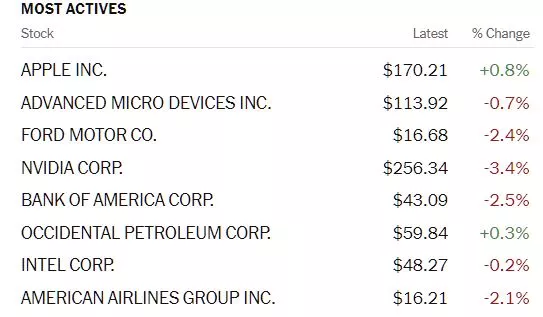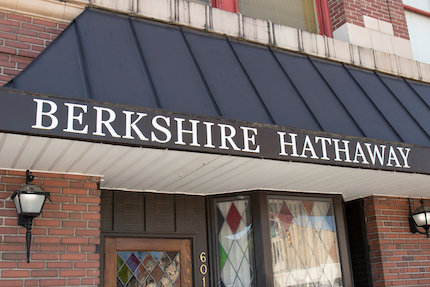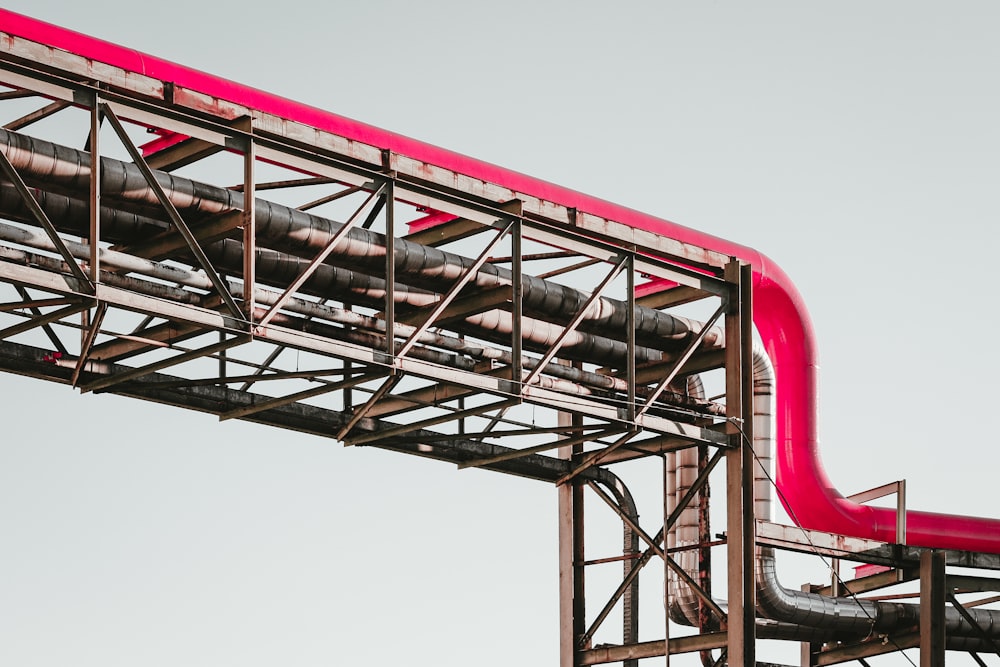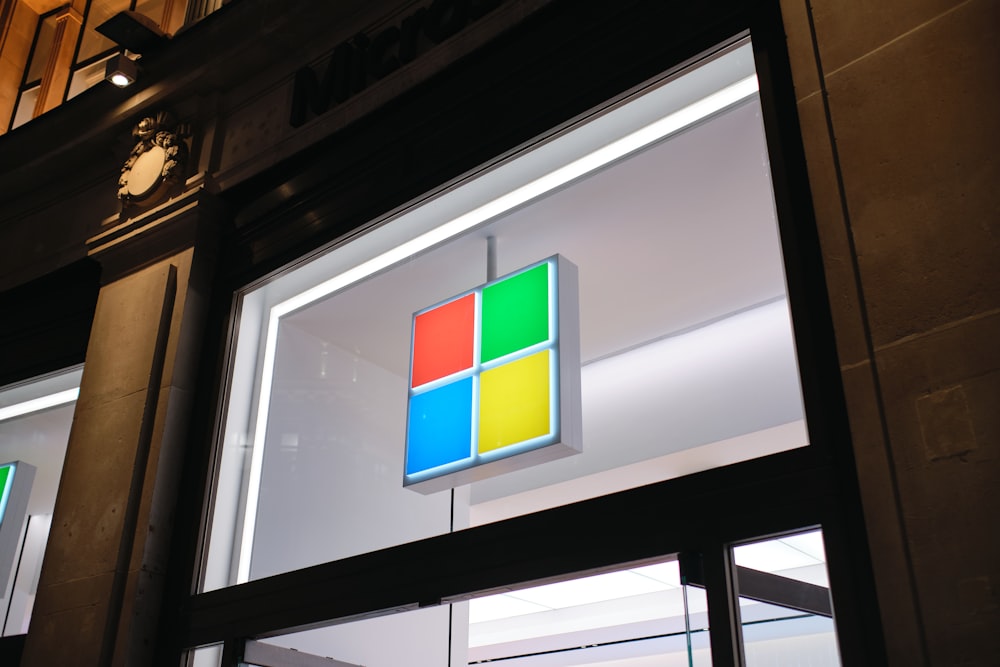Thoughts For Thursday: War, Weather And Worry
The war in Ukraine, a tornado in New Orleans and transcontinental cost of living concerns interrupted the stock market rally yesterday, as stocks closed markedly down at the end of the trading session in New York on Wednesday.

The S&P 500 closed at 4,456, down 1.23% or 55 points, the Dow closed at 34,359, down 1.29% or 449 points and the Nasdaq Composite closed at 13,923, down 1.32% or 186 points. Most actives were across major sectors and closed mostly in the red.

Chart: The New York Times
In morning trading, market futures are currently trading in the green. S&P futures are up 18 points, Dow futures are up 105 points and Nasdaq 100 futures are up 68 points.
TalkMarkets contributor Bill Baruch in a short video interview Record High Inflation In Summer Season?, says "S&P 500 is up 9 times, up 1% or more, in the past 22 trading days, which has happened only twice in the history of the market. I believe it's the start of something big looking farther out." and argues that the stock market may hit new records highs in August. His believes that yesterday's market drop is just the market back testing to prior lows and is something to be expected, rather than a shift back downwards.
Contributors Warren Patterson and Wenyu Yao continue to see strength (read-high prices) in European gas and oil prices in their article The Commodities Feed: European Gas Explodes On Payment Uncertainty.
"Oil prices surged by more than 5% yesterday, which saw Brent settling above $120/bbl. A key driver for the move appears to be further supply disruptions from the Black Sea...The drawdown in stocks was largely driven by an increase in export volumes with them growing by 908Mbbls/d over the week. In addition, refinery run rates edged higher, which saw crude inputs increase by 277Mbbls/d. However, crude oil stocks did increase by 1.24MMbbls at Cushing. This is the second week where inventories at the WTI delivery hub have edged higher, and so likely easing some concerns over tank bottoms. Although for now, this is not reflected in the prompt WTI time spread, where the backwardation has only deepened in recent days."
Photo by Martin Adams on Unsplash
"The European natural gas market saw significant strength yesterday, rallying by more than 18% and seeing prices briefly breaking above EUR130/MWh. The catalyst for the move was an announcement that Russia would require all countries they deem as ‘unfriendly’ to pay for gas in rubles...this move leaves plenty of uncertainty in the gas market...Clearly, the uncertainty over how this will play out means that European prices will likely remain well supported."
In a TalkMarkets Editor's Choice column, contributor Lance Roberts asks Is Cash Trash As Inflation Rages?
"With “zero interest rates” on savings, and inflation running nearly 8% as of this writing, it is no wonder that many believe “cash is trash.”
However, that isn’t necessarily true...
Today, I can buy one tank of gas and a whole week of groceries to feed my family. If prices rise, I can still buy one tank of gas but only 4-days of groceries for the same amount of money.
In this example, my “savings” need to grow by a rate sufficient to pay for an additional 3-days of groceries.
Notably, this is how we tend to view our “savings” in their entirety.
However, there is an essential distinction regarding our investment accounts.
In our portfolio accounts (IRA’s, 401k’s, Taxable), the “savings” held ARE NOT for buying groceries, gas, or clothing. Those funds are there to invest in assets at times that we believe the rate of return on our capital will be higher than the inflation rate.
Notably, during periods of spiking inflation, asset prices tend to experience “deflation” and become cheaper, thereby increasing the purchasing power parity of our cash."
![]()
"
I learned a long time ago that while a “rising tide lifts all boats,” eventually, the “tide recedes.” I made one simple adjustment to my portfolio management over the years, which has served me well. When risks begin to outweigh the potential for reward, I raise cash.
The great thing about holding extra cash is that if I’m wrong, I simply make the proper adjustments to increase the risk in my portfolios. However, if I am right, I protect investment capital from destruction and spend far less time ‘getting back to even.’ Despite media commentary to the contrary, regaining losses is not an investment strategy.
8-Reasons To Hold Cash
1) We are speculators, not investors. We buy pieces of paper at one price with hopes of selling at a higher price. Such is speculation in its purest form. When risk outweighs rewards, cash is a good option.
2) 80% of stocks move in the direction of the market. If the market is falling, regardless of the fundamentals, most stocks will also decline.
3) The best traders understand the value of cash. From Jesse Livermore to Gerald Loeb, each believed in “buying low and selling high.” If you “sell high,” you have raised cash to “buy low.”
4) Roughly 90% of what we think about investing is wrong. Two 50% declines since 2000 should have taught us to respect investment risks.
5) 80% of individual traders lose money over ANY 10-year period. Why? Investor psychology, emotional biases, lack of capital, etc. Repeated studies by Dalbar prove this.
6) Raising cash is often a better hedge than shorting. While shorting the market, or a position, to hedge risk in a portfolio is reasonable, it also merely transfers the “risk of being wrong” from one side of the ledger to the other. Cash protects capital and eliminates risk.
7) You can’t “buy low” if you don’t have anything to “buy with.” While the media chastises individuals for holding cash, it should be somewhat evident that you can’t take advantage of opportunities without cash.
8) Cash protects against forced liquidations. One of the biggest problems for Americans is a lack of cash to meet emergencies. Having a cash cushion allows for handling life’s “curve-balls” without being forced to liquidate retirement plans. Layoffs, employment changes, etc., are economically driven and tend to occur with downturns that coincide with market losses. Having cash allows you to weather the storms."
Food for thought.

Image Source: Pixabay
Contributor and economist Scott Sumner writes Yes, We Can "Whip Inflation Now" and it is largely a matter of Fed policy whether we do or don't.
"...I agree that the Fed policy won’t have much impact on inflation this year. But that’s not because it cannot affect current inflation, rather because the Fed will likely choose not to do so...If the Fed actually were to adopt a tight monetary policy, inflation would fall almost immediately. The misconception about long and variable lags is due to two factors:
1. The assumption that many prices are sticky.
2. The assumption that the Fed cannot affect the relative price of commodities.
The first assumption is true but misleading, while the second is false. When the Fed adopts a dramatic change in monetary policy, the relative price of commodities responds immediately, and so does the overall price level...When the Fed adopts a very tight monetary policy, as in late 1929, NGDP falls sharply. Both prices and output fall, with the fall in commodity prices being much more rapid than the fall in stickier goods prices...Today, a dramatic move toward tighter money would cause relative commodity prices to decline almost immediately. Headline inflation would fall substantially, even in 2022, although the decline in core inflation would be more gradual...The fact that inflation is not slowing right now is not an indication that the Fed’s tight money hasn’t yet begun to work; it’s a sign that the Fed has not yet adopted a tighter monetary policy. Let’s hope they do so in the near future. I’d like to see them bring NGDP growth down to no higher than 4% in 2022."
Doing that without causing a severe recession in the middle of a persistent global pandemic and a waging war in Europe is something I believe we would all embrace. If anyone has the right algorithm for that, please FedEx-it to the Fed post haste.
In the "Where To Invest Department" contributor Tony Daltorio in a TalkMarkets Editor Choice piece entitled Is Warren Buffett’s Value Investing Still Relevant? says the answer is clearly, yes and in the current environment, value beats growth hands down.

"...as of a month ago, Berkshire Hathaway was in the process of passing up the ARK Innovation Fund (ARKK), run by the “queen of the Bull Market”, Cathie Wood, for post-pandemic performance. It is now ahead in that race between the tortoise and the hare. Here are the numbers comparing the two for the past year and year-to-date: over the past year, Cathie is down 52% and Warren is up 33%; year-to-date Cathie is down 38% and Warren is up 12.5%...I believe that Buffett’s investing style is suited perfectly to fit just about any economic environment over the long-term. That’s because, to Buffett, all investing is value investing...I expect Buffett and Berkshire Hathaway to continue outperforming in the current tumultuous global environment. The common (BRK-B) shares are a buy anywhere around the current price of $330 a share."
On the growth side of the table TalkMarkets contributor Michael A. Robinson posits Why Microsoft Is Really The Best Defense Stock To Own Right Now.
"Specifically, they (MSFT) just signed a contract to provide game-changing technology to U.S. soldiers that could be an incredible force multiplier on the battlefields of the 21st century. And they're just about the only company around that can actually pull it off.
Photo by Aktar Hossain on Unsplash
Let me show you why it's set to double its earnings in as little as 2.5 years with the help of this new contract...With support from companies like Microsoft, U.S. soldiers will (now have) an addition to their arsenal (that) comes in the form of custom-designed, AR-equipped helmets. They're calling it the Integrated Visual Augmentation System (IVAS), and frankly, it's awesome...Headsets like these play a key role in the virtual reality (VR) sector that was worth roughly $6.3 billion last year. By the end of 2028, this is a market that will be worth $84 billion, according to Fortune Business Insight. The current Pentagon contract is for over 120,000 headsets set to get in the hands of U.S. Army soldiers in September. Over the next decade, the contract could be worth as much as $21.88 billion. Now, these headsets are fancy, but on their own they can't do much. That's where the other part of Microsoft's expertise - cloud computing and networking - come in. The IVAS tech works in large part because the units will all be linked to each other and with the U.S. Army's larger data network. In fact, that's partly why Microsoft was originally awarded a $10 billion contract to provide the Pentagon with its own secure and global cloud service...The expertise that Microsoft will gain from deploying its AR (augmented reality) technology with the Army will feed back to its civilian AR tech, and push forward its metaverse technology as well - which will be a huge source of growth for the company, as the metaverse market is set to explode to $8 trillion over the next two decades...And there's no questioning Microsoft's history of trouncing the market. Over the past five years, the firm's stock is up 325% compared to the S&P 500's 80% gain."
Caveat Emptor.
I'll be back on Tuesday.

Contribute to Ukrainian Relief





